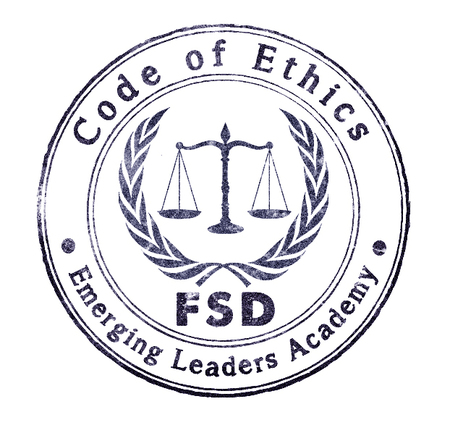FSD Emerging Leaders
Page Navigation
- Welcome to the Emerging Leaders Academy!
- CPSEL 1 - Development and Implementation of a Shared Vision
- CPSEL 2 - Instructional Leadership
- CPSEL 3 - Management and Learning Environment
- CPSEL 4 - Family and Community Engagement
- CPSEL 5 - Ethics and Integrity
- CPSEL 6 - External Context and Policy
- Emerging Leaders Academy Reflection
-
CPSEL 5 - Ethics and Integrity
-
Standard 5
Modeling a personal code of ethics and developing professional leadership capacity.- Model personal and professional ethics, integrity, justice, and fairness, and expect the same behaviors from others.
-
Protect the rights and confidentiality of students and staff.
-
Use the influence of office to enhance the educational program, not personal gain.
-
Make and communicate decisions based upon relevant data and research about effective teaching and learning, leadership, management practices, and equity.
-
Demonstrate knowledge of the standards-based curriculum and the ability to integrate and articulate programs throughout the grades.
-
Demonstrate skills in decision-making, problem solving, change management, planning, conflict management, and evaluation.
-
Reflect on personal leadership practices and recognize their impact and influence on the performance of others.
-
Engage in professional and personal development.
-
Encourage and inspire others to higher levels of performance, commitment, and motivation.
-
Sustain personal motivation, commitment, energy, and health by balancing professional and personal responsibilities.

-
CPSEL 5 - Emerging Leadership Scenarios
Please access the scenarios and presentation you will create using this link.
-
Each group will be access their scenario on our shared “CPSEL 5 - Emerging Leadership - Scenarios” Google presentation
-
As a group you will…
-
Discuss your scenario
-
Use the discussion questions to guide your conversation.
-
Create two slides to present your scenario and possible solutions to your colleagues. (You may or may not use the questions in your slides).
- Creatively present your scenario and slides.
-
Slideshow Link -
-
CPSEL 5: Standard, Elements, and Example Indicators
From the Commission on Teacher Credentialing, 2014
STANDARD 5: ETHICS AND INTEGRITY
Education leaders make decisions, model, and behave in ways that demonstrate professionalism, ethics, integrity, justice, and equity and hold staff to the same standard.Element 5A: Reflective Practice
Leaders act upon a personal code of ethics that requires continuous reflection and learning.
Example Indicators:
5A-1 Examine personal assumptions, values, and beliefs to address students’ various academic, linguistic, cultural, social-emotional, physical, and economic assets and needs and promote equitable practices and access appropriate resources.
5A-2 Reflect on areas for improvement and take responsibility for change and growth.
5A-3 Engage in professional learning to be up-to-date with education research, literature, best practices and trends to strengthen their ability to lead.
5A-4 Continuously improve cultural proficiency skills and competency in curriculum, instruction, and assessment for all learners.
5A-5 Sustain personal motivation, commitment, energy, and health by balancing professional and personal responsibilities.Element 5B: Ethical Decision-Making
Leaders guide and support personal and collective actions that use relevant evidence and available research to make fair and ethical decisions.
Example Indicators:
5B-1 Consider and evaluate the potential moral and legal consequences of decisions.
5B-2 Review multiple measures of data and research on effective teaching and learning, leadership, management practices, equity and other pertinent areas to inform decision-making.
5B-3 Identify personal and institutional biases and remove barriers that derive from economic, social-emotional, racial, linguistic, cultural, physical, gender, or other sources of educational disadvantage or discrimination.
5B-4 Commit to making difficult decisions in service of equitable outcomes for students, staff and the school community.Element 5C: Ethical Action
Leaders recognize and use their professional influence with staff and the community to develop a climate of trust, mutual respect, and honest communication necessary to consistently make fair and equitable decisions on behalf of all students.
Example Indicators:
5C-1 Communicate expectations and support for professional behavior that reflects ethics, integrity, justice, and equity.
5C-2 Use a variety of strategies to lead others in safely examining personal assumptions and respectfully challenge beliefs that negatively affect improving teaching and learning for all students.
5C-3 Encourage and inspire others to higher levels of performance, commitment, and motivation by modeling transparent and accountable behavior.
5C-4 Protect the rights and appropriate confidentiality of students, staff, and families.
5C-5 Promote understanding and follow the legal, social, and ethical use of technology among all members of the school community.

